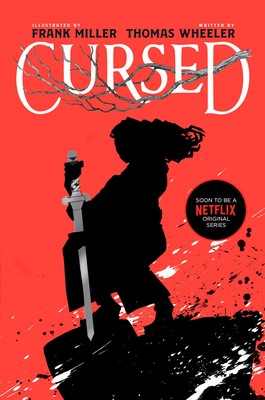Cursed by Thomas Wheeler
/Cursed
Written by Thomas Wheeler
Illustrated by Frank Miller
Simon & Schuster, 2019
When the little round sticker on the cover of Thomas Wheeler’s new YA novel Cursed says “Soon to be a Netflix original series,” it’s not kidding around: the actors involved were sprung from rehab months ago; the publicity stills have already made the rounds, and the whole thing is lumbering to an iPad near you before the year is out.
That’s the dream of nearly every YA author currently out there busily plagiarizing their betters, and it alone would be sufficient reason to garner Wheeler’s book more than what might be seen as its due share of attention. But Cursed has another and in some quarters much more powerful attraction: it’s copiously illustrated by comics legend Frank Miller, the, let’s just say quirky, genius behind legendary creations like 300, Sin City, and of course Batman: Dark Knight Returns. Miller here contributes 30 black-and-white illustrations and 8 full-color ones, making this book an item Miller completists will snap up regardless of how they feel about the book’s actual contents.
Those contents, at least on the surface, look like just another pastiche of Arthurian mythos, albeit this time of a more free-wheeling nature and with a decidedly #MeToo cast. The focus of the story is a powerful magic sword that may or may not one day go by the name Excalibur, but the hero of the tale isn’t a young Arthur; it’s an otherworldly but tough-as-nails young woman named Nimue … that Nimue, the Lady of the Lake, the enchantress who beguiles the sorcerer Merlin. Only in Wheeler’s retelling, Nimue has a very different relationship to the ancient sorcerer, and she’s a half-mystical scion of the Fey who still populate this Dark Ages land of tyrannical priests and the brutal King Uther. Arthur does show up, but he, too, is changed from any gawky, innocent boy readers might remember from The Sword in the Stone; in Cursed, he’s a hunky young itinerant swordsman who quickly falls in love with Nimue.
Uther badly wants the Sword, not only as a talisman of great power but also as a sign of his own kingly legitimacy; Nimue badly wants to keep it from him, but she also wants to secure safety for the Fey, even if it means bargaining with Uther. And the tyrannical priests, led by the most thorough-going villain of the book, Father Carden, are naturally pursuing their own agenda. On some levels, it looks like the same familiar set of premises that open a dozen YA fantasy novels every season.
Cursed defies almost all of those expectations. It’s a raw, often brutal book told in a taut prose-line that hardly ever digresses into purple prose and that reads far more like the kind of jagged, torture-laden narratives Miller has been crafting for half a century. Most of the characters, even Uther, are given more than the standard single dimension common to YA; Nimue, for instance, seems genuinely torn between the heroic destiny being thrust upon her and the kind of anonymity she craves. She confessed to Arthur that she’s always dreamed of being on a ship at sea: “To be on the ocean. To be somewhere that never ends. To sail to that point where the sea meets the sky,” she tells him, zeroing in on the real appeal: “Just to be a speck in all that stillness.”
But it’s not to be, of course; her fate is to be a kind of hero in this volume, which very much reads like the first installment in a long series.
It also reads much more like adult fantasy than anything aimed at teens, and this impression is only bolstered by Miller’s gorgeous illustrations: when those illustrations feature Arthur and Nimue, they feature cross-fit, carb-avoiding well-sexed Hollywood stars, not reedy teens. Will the series continue even if the Netflix show flops? Fresh from reading Cursed, I hope so.
—Steve Donoghue is a founding editor of Open Letters Monthly. His book criticism has appeared in The Boston Globe, The Wall Street Journal, The Historical Novel Society, and The American Conservative. He writes regularly for The National, The Washington Post, The Vineyard Gazette, and The Christian Science Monitor. His website is http://www.stevedonoghue.com.
